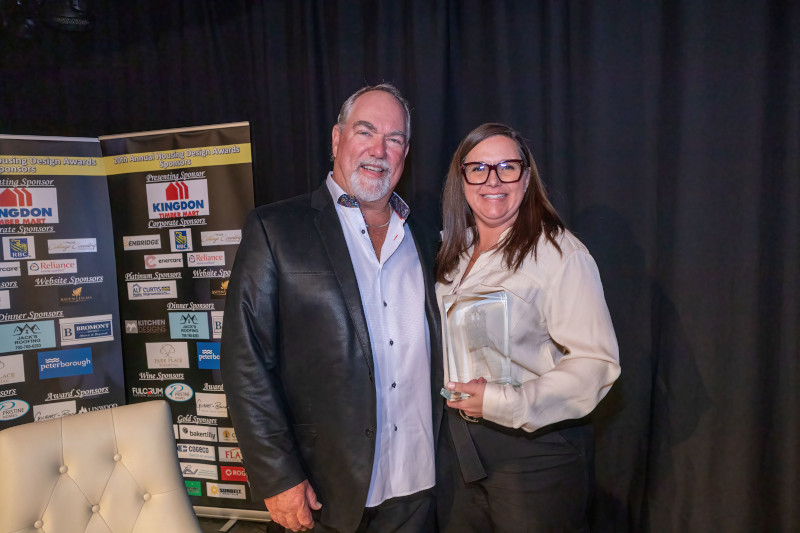The Peterborough & The Kawarthas Home Builders Association
Advocating for homebuilders
Navigating a sometimes ‘tricky’ market, PKHBA guides its members down the right construction path
Despite the current inflationary climate, one sector is still keeping busy. While slowing down somewhat since the pandemic-induced construction frenzy, the demand for new construction and home building is still considerable.
Although good news for homebuilders, the Peterborough & Kawarthas Home Builders Association (PKHBA) remains keenly aware that the sector faces some unique challenges and it has positioned itself as the voice of the local market while advocating tirelessly on behalf of its members.
Since 1956, the Peterborough & The Kawarthas Home Builders Association (PKHBA) has represented the professional home building industry throughout Peterborough and The Kawarthas area. Its mission is to facilitate the development of sustainable businesses for its members; advocate for effective government policy; maintain positive consumer experiences in the marketplace; and exchange experiences, information, and best practices.
A non-profit organization, the PKHBA is one of 27 local associations affiliated with the Ontario Home Builders Association (OHBA); and one of more than 50, affiliated with the Canadian Home Builders Association (CHBA).
 Navigating a challenging marketplace
Navigating a challenging marketplace
According to Rebecca Schillemat, Executive Officer of the PKHBA, homebuilding can be a “tricky business.” She highlights that now may be a particularly “tricky time” for homebuilders in Canada.
“A lot is happening with the building codes in Canada, right now,” she explains.
“All of the provinces have their own, and they’re working on harmonizing to have one national code. So, there are a lot of meetings going on. We’re getting information and sharing it with members and getting their feedback, so when these legislative changes come, the various governments are in mind with what is already happening in the industry. “ She continues. “
If someone in an office says you have to build a certain way, and he’s never built a house, it’s not going to make sense to the people who build houses. So, that’s a big piece of advocacy that we are working on right now: education on what the changes are and then the exchange of information on what makes sense and what should and shouldn’t be changed.”
Good relationships with local governments are, by necessity, another key part of PKHBA’s strategic plan.
“Our municipalities are very key stakeholders,” Schillemat states.
“The municipalities change the bylaws; they decide what the building guidelines are; they approve the building permits. We’ve got the City of Peterborough that we meet with fairly frequently; we meet with their planning and building departments and their councilors. I find our association has had a very good relationship with them for several years. Part of that is because we have opportunities to go to meetings together and share ideas. We also have the City of Kawartha Lakes and the County of Peterborough that we communicate with, but we’re still working on getting more regular meetings with them. So, we are working toward having more open communications with other departments and other levels of municipal representatives.”
At the municipal level, Schillemat says the association is advocating for more predictability in the building cycle.
“Like knowing how long it will take to get a permit or an approval,” she relates. “That has been a huge uncertainty, which affects the builders’ ability to decide if a project is viable or not because they don’t know how long the process will take.”
“It makes building very hard because you can’t go to the bank and say, ‘I have five hectares of land and I want to put 25 units on it.’ And the bank says, ‘Okay, if I give you this loan, when can you pay it back?’ And they say, ‘I don’t know,’ because they don’t know when their plans will be approved and they don’t get paid until the house is done and how are they going to hold millions of dollars to build housing for an undetermined amount of time? And when the banks have so much money out and they don’t know when it’s coming back, it makes it tricky. They can’t lend out more if they’re overextended and then nobody can get housing built,” she expands.
Another tricky situation for PKHBA members is the broader consumer economy and how it affects the housing market.
“Like most places in Canada, the home prices here have pretty much doubled in the past ten years, so there’s a big gap where there are not many smaller starter homes being built,”
Schillemat states.
“We don’t have enough homes for everyone and with high interest rates, it’s hard to build them and it’s tough for people to afford them. 2021 was a very good year for housing starts, so a lot of things are coming on the market and available for sale. But with the interest rates rising in 2023, the buyers don’t have the same buying power that they had in 2021. So, things aren’t lining up very well and it’s very tricky right now.”
Schillemat also points out another problem currently deterring consumers from buying homes in Canada.
“The federal government announced last week that it’s removing the GST (Goods and Services Tax) on purpose-built rentals. That means when a builder builds a new home because they’re renting it and not selling it, they don’t have to pay a tax on that to the government and the provincial government says it’s going to follow suit, so that saves the builder money and it brings down the cost of the unit for the person who’s going to live in it.”
“So, that’s a good, positive change. But there’s another issue with the GST – it didn’t exist on new housing until 1991 and they said, ‘When you buy a new house, everyone pays GST if a house is over $450,000. The threshold for that should be doubled because the house price has doubled. It would make it easier for first-time home buyers to get into the housing market. Also, you still pay the GST for every resale of that home. But on a resale house, there is no reason to have a GST on it. It just adds an extra cost to the person buying the house and it should be removed. Saving 15 percent on top of the price tag is a huge saving.”
Confronting the labor shortage
Another big concern for Schillemat is a weak labor market.
“There’s not enough skilled trades in Ontario, right now,” she laments. So, the PKHBA is partnering with local high schools to bring more young people into the trades.
“I’m trying to promote the idea that high school kids don’t necessarily need to go to college,” she says.
“They can go into the trades; try it for three or four years and at the end, if they don’t like it, there’s always college and university. But they’ve started a career where they’re making money rather than paying to go to school. And it’s not just framing a house – you can start with that, but you can move up. You can be a master carpenter; you can own a company. It’s a whole career path that has endless possibilities.”
Women are a particular target for the association.
“Our board just created a Women in Trades committee in the spring of 2023,” Schillemat reports.
“We’re gearing up to launch a mentorship program for women in skilled trades. It’s going to include an outreach component where we send some of our members to schools to talk about different skilled trades options and to show that there are women doing trades here and that you can have a long career in skilled trades and still take time off and have a family; those bumps in a career are things that men don’t have to account for.
“We try to offer anything we can to keep women who want to be in the industry to stay in the industry and then provide leadership training and support as their careers progress. We are partnering with our schools on that and with Fleming College, which already has a Building Bridges Program where they connect some of their students with people in skilled trades.”
Females currently make up only five percent of the skilled trades workforce and there is a shortage of thousands of skilled workers in Ontario. The Building Bridges Program at Fleming aims to help close the gap between the supply of skilled tradespeople and the growing demand. To that end, the college plans to double the female enrolment in its School of Trades & Technology by 2026.
The Building Bridges Program hopes to empower and encourage female students with group and one-on-one mentorship provided by industry members and Fleming experts; provide networking and engagement opportunities that will help students build connections among industry leaders and young professionals; and provide scholarships to help reduce the financial barriers to learning a trade.
“We’re also doing a mini-trade show for the first time,” Schillemat adds. “I have a few speakers lined up and they’re going to provide some education and some members will have booths.
“People can learn what the members have to offer. Students are going to come to our trade show to see what’s happening in homebuilding and potentially meet employers, and the members will get educated on some new and innovative products, as well as best practices,”Schillemat predicts.
 Educating the membership
Educating the membership
Another facet of the PKHBA mission is keeping its current membership aware of new trends in the housing industry. In educating them, and sharing appropriate information, the association works closely with the OHBA and some of its educational partners, such as EnerQuality, Canada’s #1 certifier of energy-efficient housing, whose mission is to help home builders innovate and stay competitive; and buildAbility, which offers training and core competency courses to builders, designers, and building officials.
Schillemat notes that many of these courses are online to suit busy home builders on site responsibilities.
“For a business owner to sit in a classroom and learn something — their time is money. So, if we can offer them more flexible options like the online courses, it works well. CHBA National has a lot of educational information that’s open for members to access when it’s convenient for them.”
Safety is a priority
Homebuilding is a potentially dangerous profession. Thus, the PKHBA has partnerships with local health and safety organizations, and Schillemat concedes that that type of training does need to be done in person.
“We have some great options in the City of Peterborough,” she relays. “There are two or three different first aid providers that we share information with and that our members use, and Fleming College does a lot of that too, which is great.”
PKHBA partners include the WSIB (The Workplace Safety and Insurance Board), which is the workplace compensation board for provincially regulated workplaces in Ontario; and the IHSA (The Infrastructure Health & Safety Association), a provincial program that provides resources and training to help control and eliminate safety hazards in work environments involving high-risk activities.
Going forward
According to Schillemat, all levels of government in Canada – local, provincial, and federal — agree that the country is facing a housing crisis, but there is little agreement on how to confront it. Certainly, more housing is needed but how will new homes get built?
“They say they want housing, but there are still a lot of roadblocks at all different levels for various reasons,” she opines. “In Ontario, for example, the provincial government has asked municipalities to commit to a housing target. For the City of Peterborough, that target is 4,700 homes by 2031. But the city has never built that many homes in eight years before. It would require close to doubling what has been happening. 2021 was a good year, but there were not that many housing starts in 2022, and 2023 is also looking to be quite low.
“The supply is not where it should be for the number of potential buyers in the city. There aren’t enough plans coming out and there are several projects that haven’t been approved that are still waiting in the queue at the municipality. So, there will be more housing but it’s not happening yet. There’s a strong need but it is going to take a long time,” she concludes.
AT A GLANCE
The Peterborough & The Kawarthas Home Builders Association
WHAT: A non-profit trade association
WHERE: Peterborough, Ontario
WEBSITE: www.pkhba.com


